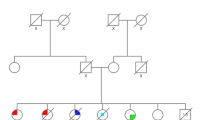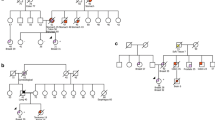Abstract
Breast cancer is the most frequent tumor in Li–Fraumeni syndrome (LFS), a rare inherited cancer syndrome associated with germline mutations in the TP53 gene. Recent data show that breast cancer in germline TP53 mutation carriers is commonly HER2+ (63–83 %). We assessed the prevalence of germline TP53 mutations in a cohort of women with HER2+ breast cancer diagnosed age ≤50 years. We identified blood specimens from 213 women with primary invasive HER2+ breast cancer age ≤50 years from a single center. Exon grouping analysis sequencing and multiplex ligation-dependent probe amplification techniques were used to screen for germline TP53 mutations. Among 213 women with HER2+ breast cancer age ≤50 years, 3 (ages at diagnosis 23, 32, 44 years) were found to carry a TP53 mutation (1.4 %, 95 % CI 0.3–4.1 %). ER/PR status was not uniform. Two TP53 carriers met Chompret criteria for LFS; none met classic LFS criteria. Although two-thirds of breast cancers in women with TP53 mutations are HER2+, we observed a low prevalence of germline TP53 mutations among unselected young women with HER2+ breast cancer. Given the potential clinical impact, consideration of germline TP53 testing should be given to young women with HER2+ breast cancer, especially if family cancer history is notable.
Similar content being viewed by others
References
Chompret A, Abel A, Stoppa-Lyonnet D, Brugieres L, Pages S, Feunteun J, Bonaiti-Pellie C (2001) Sensitivity and predictive value of criteria for p53 germline mutation screening. J Med Genet 38:43–47
Davies H, Dicks E, Stephens P, Cox C, Teague J, Greenman C, Bignell G, O’Meara S, Edkins S, Parker A, Stevens C, Menzies A, Blow M, Bottomley B, Dronsfield M, Futreal PA, Stratton MR, Wooster R (2006) High throughput DNA sequence variant detection by conformation sensitive capillary electrophoresis and automated peak comparison. Genomics 87:427–432. doi:10.1016/j.ygeno.2005.11.008
Ganguly A, Rock MJ, Prockop DJ (1993) Conformation-sensitive gel electrophoresis for rapid detection of single-base differences in double-stranded PCR products and DNA fragments: evidence for solvent-induced bends in DNA heteroduplexes. Proc Natl Acad Sci U S A 90:10325–10329
Garber JE, Goldstein AM, Kantor AF, Dreyfus MG, Fraumeni JF Jr, Li FP (1991) Follow-up study of twenty-four families with Li–Fraumeni syndrome. Cancer Res 51:6094–6097
Ginsburg OM, Akbari MR, Aziz Z, Young R, Lynch H, Ghadirian P, Robidoux A, Londono J, Vasquez G, Gomes M, Costa MM, Dimitrakakis C, Gutierrez G, Pilarski R, Royer R, Narod SA (2009) The prevalence of germ-line TP53 mutations in women diagnosed with breast cancer before age 30. Fam Cancer 8:563–567. doi:10.1007/s10689-009-9287-z
Gonzalez KD, Buzin CH, Noltner KA, Gu D, Li W, Malkin D, Sommer SS (2009) High frequency of de novo mutations in Li–Fraumeni syndrome. J Med Genet 46:689–693. doi:10.1136/jmg.2008.058958
Hernandez-Boussard T, Rodriguez-Tome P, Montesano R, Hainaut P (1999) IARC p53 mutation database: a relational database to compile and analyze p53 mutations in human tumors and cell lines. International Agency for Research on Cancer. Hum Mutat 14:1–8
Hisada M, Garber JE, Fung CY, Fraumeni JF Jr, Li FP (1998) Multiple primary cancers in families with Li–Fraumeni syndrome. J Natl Cancer Inst 90:606–611
Hwang SJ, Lozano G, Amos CI, Strong LC (2003) Germline p53 mutations in a cohort with childhood sarcoma: sex differences in cancer risk. Am J Hum Genet 72:975–983. doi:10.1086/374567
Kleihues P, Schauble B, zur Hausen A, Esteve J, Ohgaki H (1997) Tumors associated with p53 germline mutations: a synopsis of 91 families. Am J Pathol 150:1–13
Korkko J, Annunen S, Pihlajamaa T, Prockop DJ, Ala-Kokko L (1998) Conformation sensitive gel electrophoresis for simple and accurate detection of mutations: comparison with denaturing gradient gel electrophoresis and nucleotide sequencing. Proc Natl Acad Sci U S A 95:1681–1685
Lalloo F, Varley J, Ellis D, Moran A, O’Dair L, Pharoah P, Evans DG (2003) Prediction of pathogenic mutations in patients with early-onset breast cancer by family history. Lancet 361:1101–1102. doi:10.1016/S0140-6736(03)12856-5
Lalloo F, Varley J, Moran A, Ellis D, O’Dair L, Pharoah P, Antoniou A, Hartley R, Shenton A, Seal S, Bulman B, Howell A, Evans DG (2006) BRCA1, BRCA2 and TP53 mutations in very early-onset breast cancer with associated risks to relatives. Eur J Cancer 42:1143–1150. doi:10.1016/j.ejca.2005.11.032
Langerod A, Zhao H, Borgan O, Nesland JM, Bukholm IR, Ikdahl T, Karesen R, Borresen-Dale AL, Jeffrey SS (2007) TP53 mutation status and gene expression profiles are powerful prognostic markers of breast cancer. Breast Cancer Res 9:R30. doi:10.1186/bcr1675
Li FP, Fraumeni JF Jr (1969) Soft-tissue sarcomas, breast cancer, and other neoplasms. A familial syndrome? Ann Intern Med 71:747–752
Li FP, Fraumeni JF Jr, Mulvihill JJ, Blattner WA, Dreyfus MG, Tucker MA, Miller RW (1988) A cancer family syndrome in twenty-four kindreds. Cancer Res 48:5358–5362
Limacher JM, Frebourg T, Natarajan-Ame S, Bergerat JP (2001) Two metachronous tumors in the radiotherapy fields of a patient with Li–Fraumeni syndrome. Int J Cancer 96:238–242
Masciari S, Dillon DA, Rath M, Robson M, Weitzel JN, Balmana J, Gruber SB, Ford JM, Euhus D, Lebensohn A, Telli M, Pochebit SM, Lypas G, Garber JE (2012) Breast cancer phenotype in women with TP53 germline mutations: a Li–Fraumeni syndrome consortium effort. Breast Cancer Res Treat 133:1125–1130
Masciari SD, Dick MG, Robson ME, Weitzel JN, Ford JM, Balmaña J, Gruber SB, Euhus D, Garber JE (2011) Breast cancer phenotype in women with TP53 germ-line mutations: an LFS consortium effort. In: ASCO 2011, Chicago, USA
Melhem-Bertrandt A, Bojadzieva J, Ready KJ, Obeid E, Liu DD, Gutierrez-Barrera AM, Litton JK, Olopade OI, Hortobagyi GN, Strong LC, Arun BK (2012) Early onset HER2-positive breast cancer is associated with germline TP53 mutations. Cancer 118:908–913. doi:10.1002/cncr.26377
NCCN (2011) National Comprehensive Cancer Network: practice guidelines in oncology-v1.2010: genetic/familial high-risk assessment: breast and ovarian: Li–Fraumeni syndrome. http://www.nccn.org/professionals/physician_gls/PDF/genetics_screening.pdf
Nichols KE, Malkin D, Garber JE, Fraumeni JF Jr, Li FP (2001) Germ-line p53 mutations predispose to a wide spectrum of early-onset cancers. Cancer Epidemiol Biomarkers Prev 10:83–87
Schneider KA, DiGianni LM, Patenaude AF, Klar N, Stopfer JE, Calzone KA, Li FP, Weber BL, Garber JE (2004) Accuracy of cancer family histories: comparison of two breast cancer syndromes. Genet Test 8:222–228
Tinat J, Bougeard G, Baert-Desurmont S, Vasseur S, Martin C, Bouvignies E, Caron O, Bressac-de Paillerets B, Berthet P, Dugast C, Bonaiti-Pellie C, Stoppa-Lyonnet D, Frebourg T (2009) 2009 version of the Chompret criteria for Li Fraumeni syndrome. J Clin Oncol 27:e108–e109. doi:10.1200/JCO.2009.22.7967
Velasco E, Infante M, Duran M, Perez-Cabornero L, Sanz DJ, Esteban-Cardenosa E, Miner C (2007) Heteroduplex analysis by capillary array electrophoresis for rapid mutation detection in large multiexon genes. Nat Protoc 2:237–246. doi:10.1038/nprot.2006.482
Wilson JR, Bateman AC, Hanson H, An Q, Evans G, Rahman N, Jones JL, Eccles DM (2010) A novel HER2-positive breast cancer phenotype arising from germline TP53 mutations. J Med Genet 47:771–774. doi:10.1136/jmg.2010.078113
Wolff AC, Hammond ME, Schwartz JN, Hagerty KL, Allred DC, Cote RJ, Dowsett M, Fitzgibbons PL, Hanna WM, Langer A, McShane LM, Paik S, Pegram MD, Perez EA, Press MF, Rhodes A, Sturgeon C, Taube SE, Tubbs R, Vance GH, van de Vijver M, Wheeler TM, Hayes DF (2007) American Society of Clinical Oncology/College of American Pathologists guideline recommendations for human epidermal growth factor receptor 2 testing in breast cancer. J Clin Oncol 25:118–145. doi:10.1200/JCO.2006.09.2775
Wong P, Verselis SJ, Garber JE, Schneider K, DiGianni L, Stockwell DH, Li FP, Syngal S (2006) Prevalence of early onset colorectal cancer in 397 patients with classic Li–Fraumeni syndrome. Gastroenterology 130:73–79. doi:10.1053/j.gastro.2005.10.014
Acknowledgments
Dr. Elgene Lim for helpful comments on the manuscript. The work was supported by the Breast Cancer Research Foundation and the Dana-Farber/Harvard Cancer Center SPORE in Breast Cancer Grant (No. P50 CA89393). Michelle Rath received funding from the German Research Foundation.
Conflict of interest
The authors have declared no conflict of interest.
Author information
Authors and Affiliations
Corresponding author
Rights and permissions
About this article
Cite this article
Rath, M.G., Masciari, S., Gelman, R. et al. Prevalence of germline TP53 mutations in HER2+ breast cancer patients. Breast Cancer Res Treat 139, 193–198 (2013). https://doi.org/10.1007/s10549-012-2375-z
Received:
Accepted:
Published:
Issue Date:
DOI: https://doi.org/10.1007/s10549-012-2375-z




